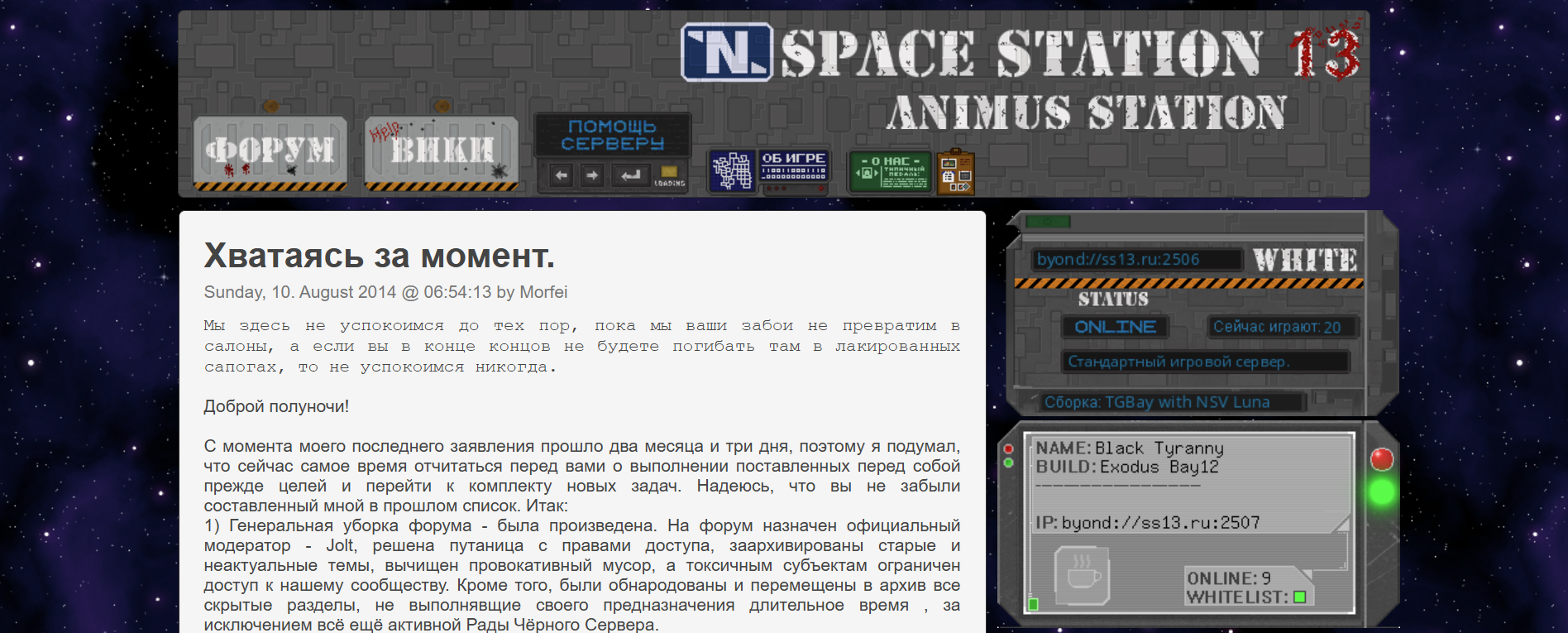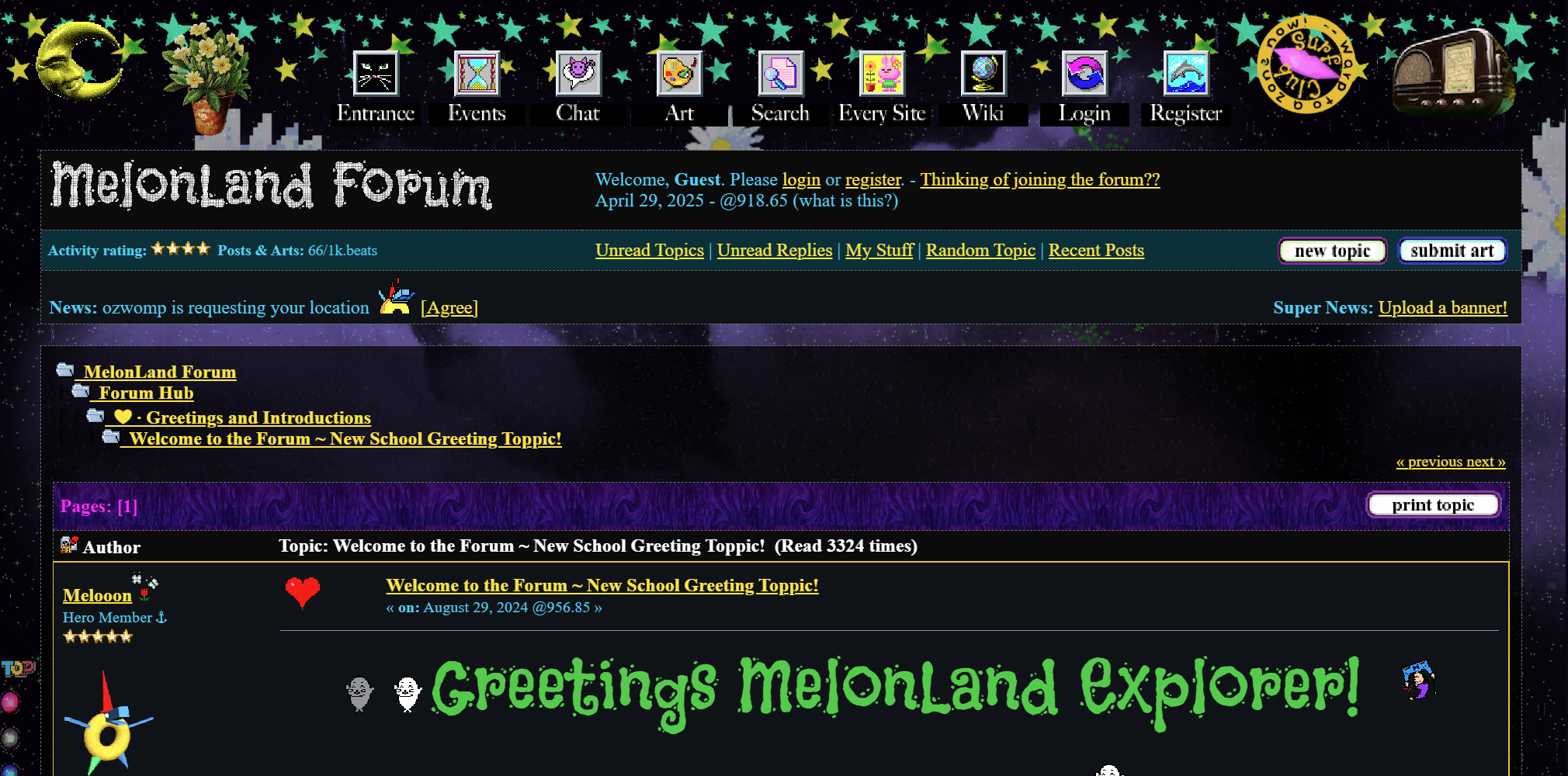Nostalgia for the old Web
I grew up on the Internet throughout the 2000s. I went to school, played Dungeons and Dragons and some collectible card games, and logged onto the forums after school. Me and a couple of my classmates were all on the same forums - and of course you’d learn about forums from your friends.
I didn’t speak English back then, and it was Russian speaking forums for me all the way. I’m not sure about now, but back then Runet (yup, that’s Russian Internet) infrastructure was lagging behind the English speaking world - dial-up was more prevalent, which informed the type of content that was popular. So my experience in the 2000s is probably reminiscent of someone’s experience in US in the 90s. Either way, it was the time only the nerdy kids were online.

This internet was a very different landscape from the Internet of today, with giant spaces like Facebook or Reddit. Back then, the communities were smaller, more tight-knit, and you’d know frequent posters. You’d know what troubles them, you’d know what their interests are - those were real people (or other kids, I guess), and you could really feel their existence on the other side of the screen.
There was something else there too. The Internet felt smaller, more intimate. The quality of discourse was better. You’d have these long forum threads going back and forth. Engagement on the Internet felt like a passion project, less commercialized. Webmasters proudly built bright (and sometimes jarring) websites. You proudly demonstrated your expert knowledge of emoji to express yourself. 🤓 It was a different time. It was a time before influencers, and passion was first and foremost. Building internet following wasn’t really a ticket to real-world fame and profit, and it felt more… pure?
In the late 2000s and early 2010s, I experienced this directly when I ran the Russian speaking server of Space Station 13 - a multiplayer spaceship crewmate simulation game (MandaloreGaming does a great job explaining what this game is, go watch it). Here’s the website I built:

I don’t want to toot my own horn too much, but doesn’t this just have more character? Facebook and other sites were already becoming popular around that time, but it was amazing having our own corner of the Internet. We had forums, a chat, a wiki… Now that I reflect, the community could get somewhat toxic, but it was a community nonetheless.
Of course, I feel so nostalgic about the time period in my life. I was a kid, I didn’t have to worry about paying taxes. I naturally maintained friendships because I went to school every weekday. I could obsess over the craziest things. But separate from that general nostalgia, the internet itself truly felt different.
There are still some online communities that have refused the change. From small niche interest forums, to an old-time giants like The Something Awful Forums. And of course IRC is still alive and kicking. I pop in and out of IRC chats every couple of years when I miss simple no-bloat chat spaces with fellow tech enthusiasts. Did you know that besides tech enthusiasts, IRC is widely used by site reliability engineers, at least at Google? Can’t be relying on bloated chat apps during an outage - and nothing beats IRC!

It’s even more interesting to see communities who try to recapture the olden days. There are folks engaging today, trying to follow the old ways. Projects like Melonland aim to capture the feeling of the old web. The fun part is that, at least from some discourse, this movement seems to be popular among the younger generation - folks who didn’t live through the early days of the Internet. It’s part of a small but growing online movement around late Gen Z and early Gen Alpha’s striving for digital minimalism.
For me it’s largely about the nostalgia and simplicity. A different time, but also the Internet that put self expression first and foremost, before monetization underlining every word. It’s a time where you had to seek out content to engage with, and not the other way around (looking at you, algorithmic feeds).
2 read-only comments
These are the read-only comments I've exported from Disqus (which I no longer use). If you'd like to share your thoughts about this article, you can ✍️ Reply by email.
A lovely remembrance of the web of the past. And of the web now, if you go looking for it. Some never went away, some has been revived.
Yeah, I've learned about the IndieWeb shortly after writing this up (link hopping from the Melonland out of all places). I've been binge reading the Wiki and my RSS is filling up with diverse, personal, and authentic sites (including artlung.com)!